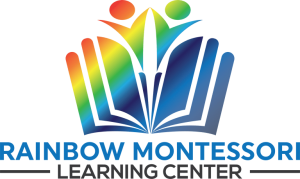Curriculum
At Rainbow Montessori Learning Center, we are committed to engaging students in thoughtful pursuits and encouraging a lifelong love of learning through curriculum presented in a well-structured environment where our teachers (or “guides”) provide assistance and a consistent approach to support the development of orderly thoughts. Our goal is to help every child develop their innate, ultimate potential through high self-expectations in an environment that fosters self-motivated and intrinsic learning.
Our curriculum addresses a multitude of topics and areas of personal development, including but not limited to the following; Culture Studies, Emotional Intelligence, Intellectual Intelligence, Language Skills, Mathematics, Moral Intelligence, Practical Life Skills, Science, Sensorial Learning, and Social Intelligence.
Curriculum For Early Learners
From 2 to 3 years of age, we will provide a range of experiential activities designed to engage your child and lay the groundwork for future education, including but not limited to:
- Book reading and storytelling
- Carrying items on a tray
- Balancing/Climbing
- Cutting apples, bread, etc.
- Brushing teeth
- Stacking blocks
- Dressing oneself
- Feeding oneself
- Cooking
- Colors
- Matching and sorting
- Engaging with playground equipment
- Potty training
- Puzzles
- Singing
- Stairs
- Washing dishes
- Washing hands and face
Preschool
The Montessori approach to education was grounded in four planes of human development. The first plane, which occurs between birth and six years of age, is characterized by dramatic physical and psychological development in the child. Montessori referred to the child’s ability to assimilate sensory and stimulus information from things such as language, sense, and cultural practices as being tied to them having an absorbent mind. Montessori believed the absorbent mind to be unique to this plane and an attribute that begins to fade around the age of six years old.
Drawing on this understanding of cognitive and emotional development, programming in these classrooms is characterized by practical activities designed to develop skills like sweeping, spooning, pouring, or washing up, along with other more traditional fields of education, including but not limited to the following:
- Academic Programs to ensure your child’s learning
- Arts and Crafts
- Foreign Language
- Geography
- Math
- Music
- Physical Education
- Science
- Social Science
- Verbal Skills
- Written Communication
